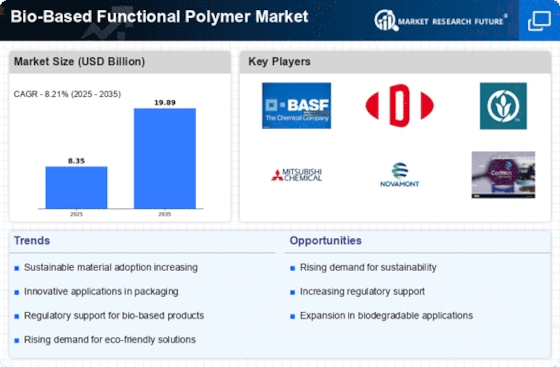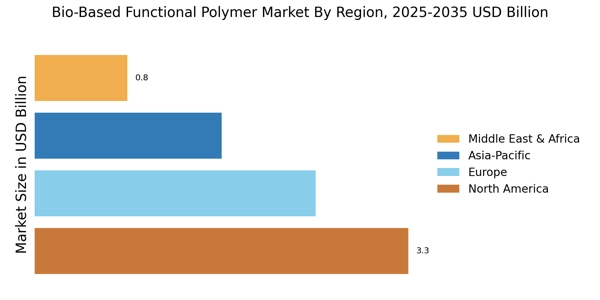Supportive Regulatory Frameworks
The establishment of supportive regulatory frameworks is likely to bolster the Bio-Based Functional Polymer Market. Governments across various regions are implementing policies that encourage the use of bio-based materials, aiming to reduce reliance on fossil fuels and promote sustainable practices. For example, regulations that mandate the use of biodegradable materials in packaging are driving manufacturers to explore bio-based alternatives. This regulatory support not only enhances market visibility but also incentivizes research and development in the bio-based sector. As a result, the Bio-Based Functional Polymer Market is expected to experience accelerated growth, as companies align their strategies with regulatory requirements and consumer expectations for sustainable products.
Innovations in Polymer Technology
Technological advancements in polymer science are playing a crucial role in shaping the Bio-Based Functional Polymer Market. Innovations such as improved synthesis methods and enhanced material properties are enabling the development of high-performance bio-based polymers. For instance, breakthroughs in biopolymer processing techniques have led to the creation of materials that exhibit superior mechanical strength and thermal stability. This evolution in technology is expected to expand the application range of bio-based polymers, making them viable alternatives to conventional plastics. As a result, the market is anticipated to witness a surge in demand from sectors such as construction, electronics, and healthcare. The Bio-Based Functional Polymer Market stands to gain from these innovations, as they facilitate the production of more efficient and sustainable materials.
Rising Demand for Eco-Friendly Materials
The increasing consumer awareness regarding environmental sustainability appears to drive the Bio-Based Functional Polymer Market. As industries seek to reduce their carbon footprints, the demand for eco-friendly materials has surged. According to recent data, the market for bio-based polymers is projected to grow at a compound annual growth rate of approximately 12% over the next five years. This trend indicates a significant shift towards sustainable alternatives in various applications, including packaging, automotive, and textiles. Companies are increasingly investing in bio-based functional polymers to meet consumer preferences for greener products, thereby enhancing their market competitiveness. The Bio-Based Functional Polymer Market is likely to benefit from this rising demand, as manufacturers innovate to create materials that not only meet performance standards but also align with environmental goals.
Growing Applications in Diverse Industries
The versatility of bio-based functional polymers is contributing to their increasing adoption across various industries, thereby driving the Bio-Based Functional Polymer Market. These materials are being utilized in sectors such as automotive, construction, and consumer goods, where their unique properties can be leveraged for enhanced performance. For instance, bio-based polymers are being integrated into automotive components to reduce weight and improve fuel efficiency. Additionally, their application in construction materials is gaining traction due to their durability and environmental benefits. This broadening application spectrum suggests a robust growth trajectory for the market, as industries recognize the advantages of incorporating bio-based materials into their products. The Bio-Based Functional Polymer Market is poised to capitalize on this trend, as more sectors seek sustainable solutions.
Consumer Preference for Sustainable Products
The shift in consumer preferences towards sustainable products is a significant driver for the Bio-Based Functional Polymer Market. As awareness of environmental issues grows, consumers are increasingly seeking products that are not only functional but also eco-friendly. This trend is evident in the rising demand for packaging solutions that utilize bio-based materials, as consumers become more conscious of their purchasing decisions. Market Research Future indicates that a substantial percentage of consumers are willing to pay a premium for products that are marketed as sustainable. This consumer behavior is prompting manufacturers to innovate and incorporate bio-based functional polymers into their offerings. Consequently, the Bio-Based Functional Polymer Market is likely to thrive as companies adapt to meet the evolving expectations of environmentally conscious consumers.

















